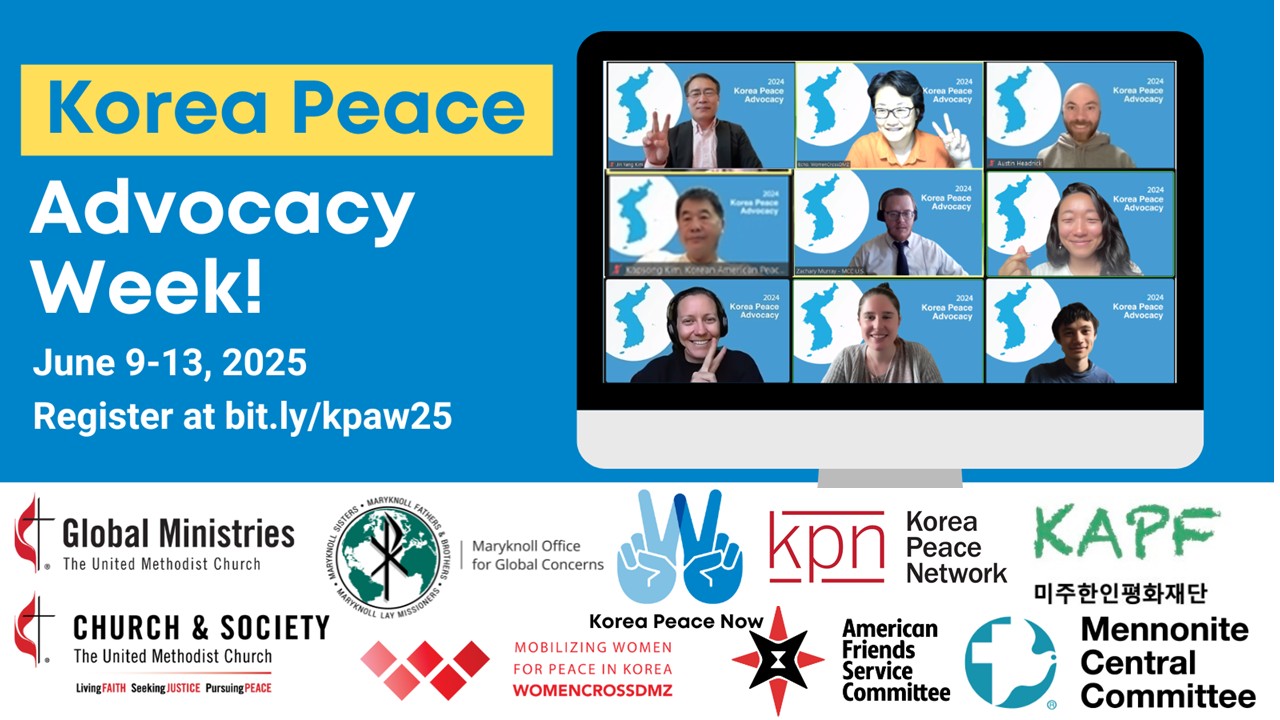Korea Peace Advocacy in Uncertain Times
People from around the United States are invited to participate in Korea Peace Advocacy Week June 9-13, during a fraught time on the Korean Peninsula.
Advocacy Week organizers the Korea Peace Network — a coalition of faith-based and Korean-American peace groups including Maryknoll Office for Global Concerns — invite people from across the United States to register for the virtual event. Participants will receive training on how to lobby Congress, and background information on the prospects for and challenges to peace between North and South Korea, and the role of the United States in the conflict. The primary objective will be to urge lawmakers to co-sponsor and pass the Peace on the Korean Peninsula Act.
Peace between North Korea and South Korea is a longstanding unresolved issue, one in which the United States has an important role to play. Fighting was halted in the Korean War by way of an armistice agreement in 1953 between North Korea and the United States, but a peace treaty was never signed. Technically, the war continues, and the decades-long standoff has resulted in a dangerous militarization of the peninsula, now including the threat of U.S. and North Korean nuclear weapons. The United States has troops in South Korea, and carries out annual military exercises with the South Korean military, adding to tensions with North Korea.
During his first term, President Trump held historic talks with North Korean leader Kim Jong Un, culminating in a summit in Hanoi in 2019. Ultimately the talks failed, as the United States rejected North Korean demands to lift all economic sanctions on the country, and North Korea rejected U.S. demands that the nation unilaterally and entirely do away with its nuclear weapons program. Talks have not yet resumed.
President Trump has expressed an interest in re-opening negotiations with North Korea, and has even suggested that some form of communication between the two governments has begun. But there is no clear framework for such talks, with little change on the issues behind the impasse in Hanoi. Meanwhile, Kim changed North Korea’s long-standing policy toward South Korea in 2023, abandoning his government’s official goal of unification, declaring South Korea an “enemy” and describing the relationship between the two countries as one between “belligerent states.”
The political future of South Korea will also impact the prospect of peace. Conservative President Yoon Suk Yeol was removed from office on April 4 after being impeached for declaring martial law and trying to shut down the country’s legislature in December. A snap election will be held on June 3, and polls currently favor opposition leader Lee Jae-myung, who advocates positive engagement with North Korea, saying in a recent debate, “Unification may sound like a far-off goal, but increasing inter-Korean exchanges is where we begin… At the end of the day, the government’s job is to build peace.”
Another tension between North Korea and the West has been North Korea’s support for Russia’s war in Ukraine. But President Trump’s relatively friendly relationship with Russia, while troubling to Ukraine and many U.S. allies, could mean he would be less inclined to let the issue stymie negotiations between the United States and North Korea.
The challenges to peace are many, but it is precisely at this moment of change that peace advocates hope to drive home the need for politicians to seek an official end to the Korean War, increased diplomacy, and reduced tensions between North and South Korea. Denuclearization and reunification may not be possible in the short-term, but a peace treaty and increased engagement with North Korea would reduce the risk of nuclear war and could open the door to both nuclear disarmament and reunification in the future. The pursuit of a peace agreement would also ease humanitarian aid to North Korea and allow the reuniting of divided families, including those of many Korean Americans.
The Peace on the Korean Peninsula Act would call upon the Executive Branch to pursue a lasting peace agreement and the official end of the Korean War, and require the Secretary of State to report to Congress on steps taken to carry it out. The current approach of devastating economic sanctions, uncompromising insistence on immediate and total denuclearization, and insistence on military exercises keeps families divided, increases tensions, and puts the Korean Peninsula, the United States, and the world at risk of nuclear war. It is time to pursue peace.
Faith in action: Take part in Korea Peace Advocacy Week June 9-13. Registrants will join two to three half-hour virtual meetings with the staff of their Representative and Senators. There will be an online training the evening of May 29. Click here to register by May 16.

